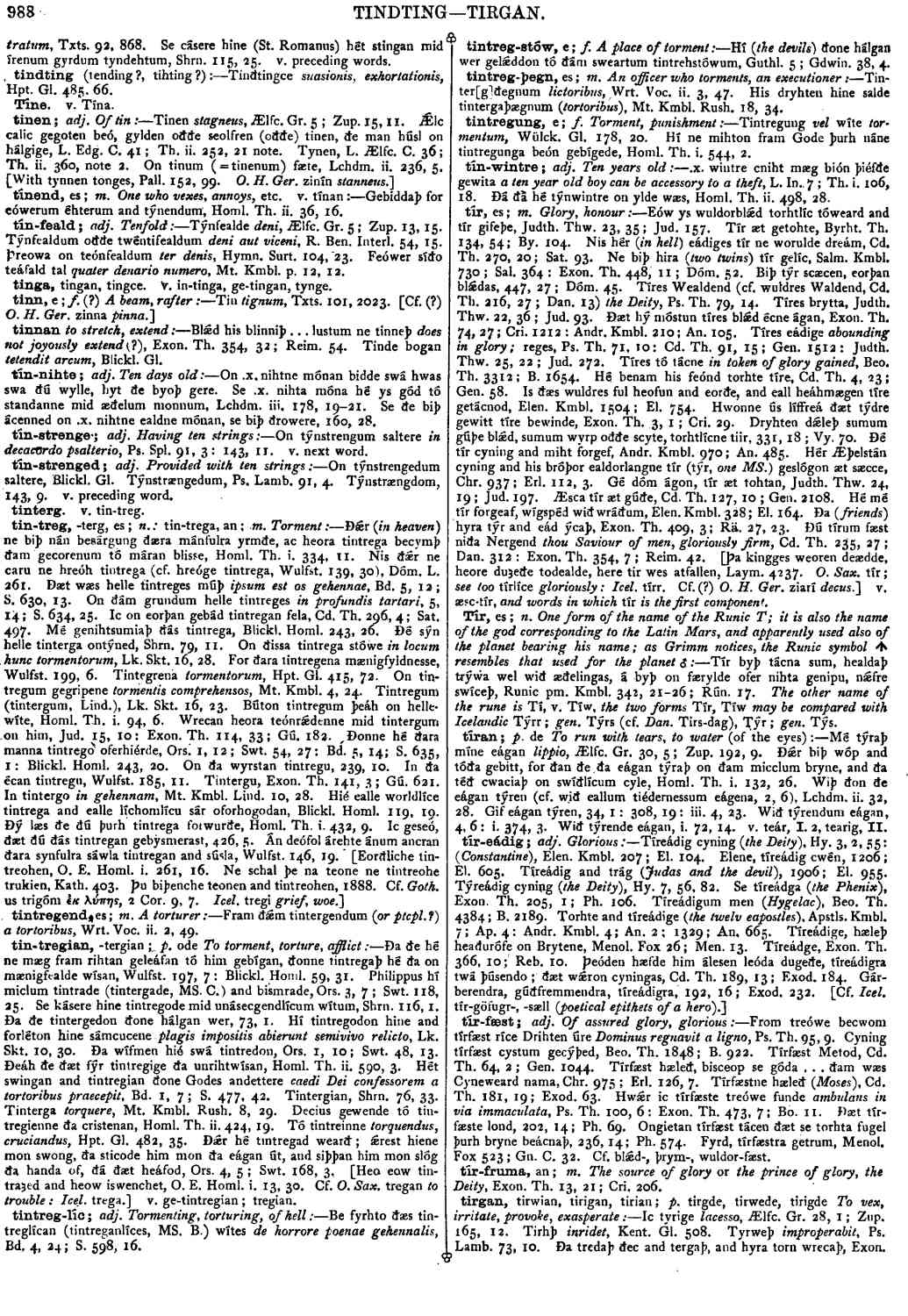tír
- noun [ masculine ]
-
Eów ys wuldorblǽd torhtlíc tóweard and tír gifeþe,
- Judth. Thw. 23, 35; Jud. 157.
-
Tír æt getohte,
- Byrht. Th. 134, 54; By. 104.
-
Nis hér (
in hell
) eádiges tír ne worulde dreám,- Cd. Th. 270, 20; Sat. 93.
-
Ne biþ hira (
two twins
) tír gelíc,- Salm. Kmbl. 730;
Sal. 364: Exon. Th. 448, 11; Dóm. 52.
-
Biþ týr scæcen, eorþan blǽdas,
- 447, 27; Dóm. 45.
-
Tíres Wealdend (cf. wuldres Waldend, Cd. Th. 216, 27; Dan. 13)
the Deity,
- Ps. Th. 79, 14.
-
Tíres brytta,
- Judth. Thw. 22, 36; Jud. 93.
-
Ðæt hý móstun tíres blǽd écne ágan,
- Exon. Th. 74, 27; Cri. 1212: Andr. Kmbl. 210; An. 105.
-
Tíres eádige
abounding in glory;
reges,- Ps. Th. 71,
10: Cd. Th. 91, 15; Gen. 1512: Judth. Thw. 25, 22; Jud. 272.
-
Tíres tó tácne
in token of glory gained,
- Beo. Th. 3312; B. 1654.
-
Hé benam his feónd torhte tíre,
- Cd. Th. 4, 23; Gen. 58.
-
Is ðæs wuldres ful heofun and eorðe, and eall heáhmægen tíre getácnod,
- Elen. Kmbl. 1504; El. 754.
-
Hwonne ús líffreá ðæt týdre gewitt tíre bewinde,
- Exon. Th. 3, 1; Cri. 29.
-
Dryhten dǽleþ sumum gúþe blǽd, sumum wyrp oððe scyte, torhtlícne tiir,
- 331, 18; Vy. 70.
-
Ðé tír cyning and miht forgef,
- Andr. Kmbl. 970; An. 485.
-
Hér Æþelstán cyning and his bróþor ealdorlangne tír (týr,
one MS.
) geslógon æt sæcce,- Chr. 937;
Erl. 112, 3.
-
Gé dóm ágon, tír æt tohtan,
- Judth. Thw. 24, 19; Jud. 197.
-
Æsca tír æt gúðe,
- Cd. Th. 127, 10; Gen. 2108.
-
Hé mé tír forgeaf, wígspéd wið wráðum,
- Elen. Kmbl. 328; El. 164.
-
Ða (
friends
) hyra týr and eád ýcaþ,- Exon.
Th. 409, 3; Rä. 27, 23.
-
Ðú tírum fæst niða Nergend
thou Saviour of men, gloriously firm,
- Cd. Th. 235, 27; Dan. 312: Exon. Th. 354, 7; Reim. 42.
Bosworth, Joseph. “tír.” In An Anglo-Saxon Dictionary Online, edited by Thomas Northcote Toller, Christ Sean, and Ondřej Tichy. Prague: Faculty of Arts, Charles University, 2014. https://bosworthtoller.com/30558.
Checked: 0